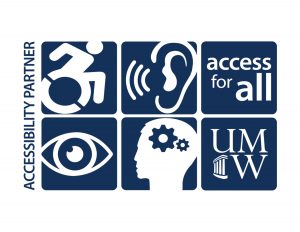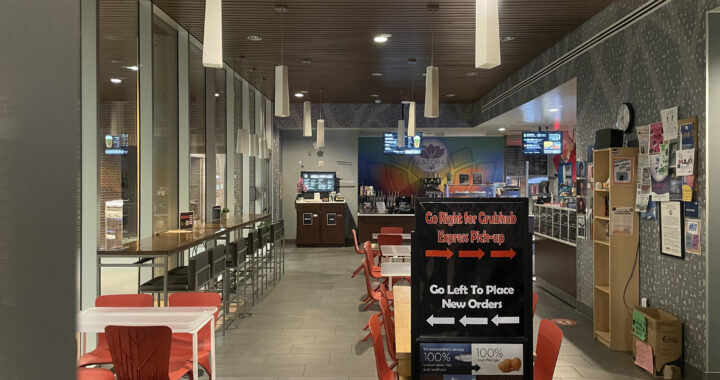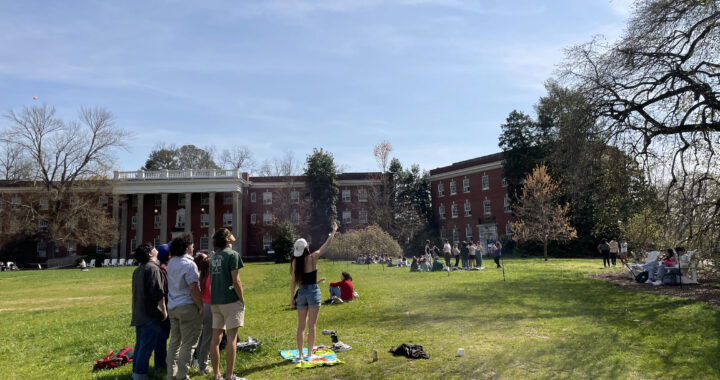ODR encourages faculty to caption videos for HoH community
3 min read
Closed Captioning can be beneficial for all students, not just those who are hard-of-hearing | Disability Resources
ANNE SMITH
Staff Writer
The outbreak of COVID-19 has brought new challenges for everyone, and this is no exception for students who experience hearing loss or difficulty. They are facing some obstacles having to adapt while using Zoom and other formats as sources for online education.
Claudia Woods is a Deaf student who uses hearing aids here at UMW. “I began learning ASL on my own during university and made many online Deaf friends.”
According to Woods, there have been some advantages to an increasingly online day-to-day.
“I’ve actually had an easier time since going [virtual],” Woods said. “There’s a saying that disabled people have more of a social life online than offline, and I think in my experience it’s true.”
One option to accommodate hard-of-hearing students is closed captioning. With education being online, a resource like CC has been an example of the advantages online educational formats may provide.
Within a normal pre-COVID-19 semester, some services provided for hearing loss or Deaf students are ASL interpreters, CART (Communication Access Realtime Translation) real-time speech-to-text transcription services, Typewell meaning-for-meaning real-time speech-to-text transcription services, and appropriate Assistive Listening Devices.With only about 10 students registered through through the Office of Disability Resources with hearing loss or difficulty, they aren’t the largest group that ODR works with, but they do experience some of the greatest need in regards to the changing educational format.
“The university doesn’t provide closed captions outside the classroom, meaning clubs, events, therapy meetings, meetings in general won’t have captions for me, so I will use Otter.Ai, a free captioning service to communicate,” said Woods.
Even though the community of hard of hearing is a small one, closed captioning can benefit other students as well. This service can aid several demographics: those who are learning English, students who learn better by reading and those who benefit from having class information in writing due to attention difficulties.
The disabled community is a part of the University’s student body, so part of receiving an education is having equal access to materials presented in the course, allowing for each student to advocate for themselves and be able to have access to required services in order to be independent. With in-class lectures, students being able to understand what the instructor is saying is a fundamental element of classroom learning. Getting professors to participate in universally providing aid has been another unexpected issue.
“We tried to encourage faculty to caption their videos and use captioned videos, because it allows for a more accessible experience for all,” said Jessica Machado, director of the ODR. “Of course, this means faculty often have to caption their own videos, which can be time-consuming and difficult for a variety of reasons. It means student organizations would also need to think about how they caption their own videos that are posted on social media or websites – but when we all consider ways, we can support our shared mission for access for all at UMW, it’s a good thing for everyone.”
Dr. Melissa Wells, assistant professor at College of Education is taking advantage of utilizing the tool of Closed Captioning.
“CC benefits the hard-of-hearing community and beyond,” said Wells. “For example, one student’s speakers stopped working one day in class, so they were able to continue participating in class by reading along with our CC. Even in the classroom teaching socially distanced with masks on, CC can help people at the back of the room hear what is going on more clearly. In education, we talk about Universal Design for Learning (UDL), which is a framework for designing instruction by anticipating learners’ needs from the beginning.” In order to solve this, ODR has developed training videos in order to encourage not only course instructors but anyone within the university community to see the importance and utilize this tool more.”
“We’ve tried to develop training videos – including event accessibility for digital and in-person events which can be found on our website for event accessibility considerations at UMW and were shared broadly across the UMW community with partners, as well as our Access for All open educational resource, which has tons of videos and guides – including those specific to closed captioning.” said Machado.
As more professors have started integrating closed captioning as a fundamental part of presenting their lectures over Zoom, many in the hard-of-hearing community hope that this will eventually become a standard practice even after COVID-19.











